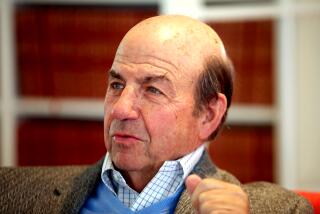Imagine the Marx Brothers as Editors : THE MIDNIGHT EXAMINER <i> by William Kotzwinkle (Houghton Mifflin/ Seymour Lawrence: $17.95; 228 pp.) </i>
- Share via
There’s something in this book to offend everyone: blacks, Jews, Arabs, Italians, Irish, women. Author William Kotzwinkle, who was most successful with his novelization of “ET: the Extraterestrial,” seems to have rebelled against the saccharine sweetness of ET. With a vengeance.
Howard Halliday is the editor of Chameleon Publications, a group responsible for the sleaze that clutters most newsstand racks. Their magazines include lurid romances, soft-core pornography, true crime, celebrity drivel, and a pseudo-religious rag for the desperately faithful. As well as the Midnight Examiner, modeled on the old National Enquirer. That is, instead of featuring celebrity gossip and stories about Elvis’ trip on a UFO where he learned how to cure cancer (like the modern-day tabloid), Midnight Examiner specializes in the grotesque.
“Upon the wall of my cubicle hung other photographs of atrocities, anomalies of birth, both human and animal, and other bits and pieces of life that come an editor’s way, and which he uses when and where he can to add dimension to his publications,” Halliday muses. “Photographers frequently risk their life to get such shots, and I, in turn, paid them as little as I could.”
Kotzwinkle populates the Chameleon office with a gaggle of bizarre losers. There’s the schizophrenic-catatonic artist who has an obsession with cows in dresses, the cheapskate publisher who shoots at his staff with a poisoned blowgun, the alcoholic ex-newsman, a sexually repressed woman who dreams up romances gone sour, and several other characters whose neuroses blend and conflict with each other.
The incident that sets the minimal plot in motion involves a buxom porno star-poetess who shoots her Mafioso producer when he interrupts her lunch break. She seeks refuge in the Midnight Examiner office and the staff bands together to battle the mobster.
While detailing the office shenanigans, the book is more amusing then offensive. But when the action moves out into New York’s streets, the cliched racism and sexism becomes more mean-spirited.
There’s the crazed Egyptian cab driver, a grave robber at heart. He brings with him his overly made up prepubescent daughter who sells hot goods. The cabbie transports the staff to the salon of an obese black Voodoo queen who aids the Chamelon crew in their battle with the Mafioso in return for a shopping spree at Bloomingdale’s and a lifetime of free ads in the Midnight Examiner.
Kotzwinkle, a talented writer known for his humorous imagery, packs the book with madcap action. There’s a level of zany activity that would do the Marx Brothers justice.
While most of the character development is intentionally cartoony, the scene setting can be quite masterful:
“High stone walls ran longside us, and above them the dark overhang of branches; nature in Manhattan means human nature, except here in Central Park, where tortured grass prevails along with a few thousand trees, in whose gray and dusty arbor hide lovers, Audubon members, and delinquent gangs. Along the fractured concrete countless millions of New Yorkers tramp, decade in and out, extracting the essence from their oasis. I myself wander there on weekends, perception distorted by drink, drugs, or jogger’s endorphins, depending on which discipline or lack of it I happen to be following at the moment.”
Despite his skillful writing, too often Kotzwinkle goes for cheap, nasty laughs. Any fledgling standup comic can get an easy snicker with jokes about sleazy publications or New York madness.
Black humor is a delicate act, skirting the edge of good taste, maybe occasionally stepping over the line. But Kotzwinkle, who has 15 novels, including several cult classics, under his belt, is blasting fruit flies with a bazooka in this one. And he leaves too many holes in the wall.
More to Read
Sign up for our Book Club newsletter
Get the latest news, events and more from the Los Angeles Times Book Club, and help us get L.A. reading and talking.
You may occasionally receive promotional content from the Los Angeles Times.






